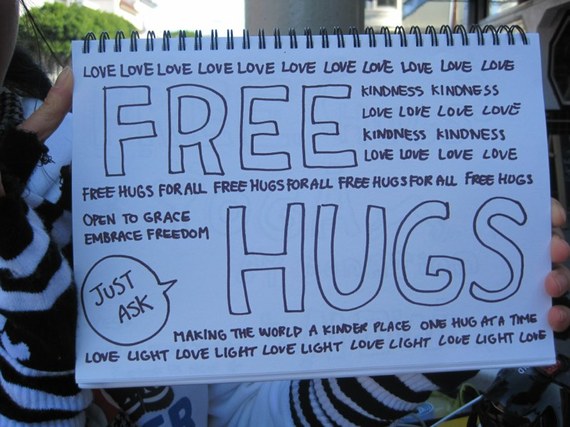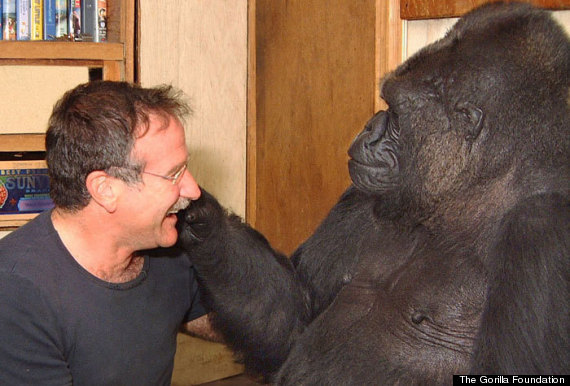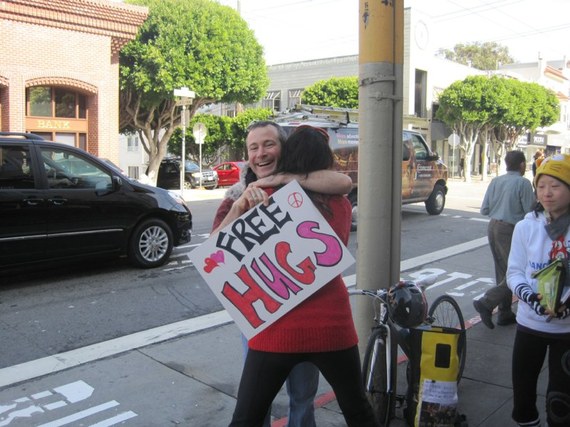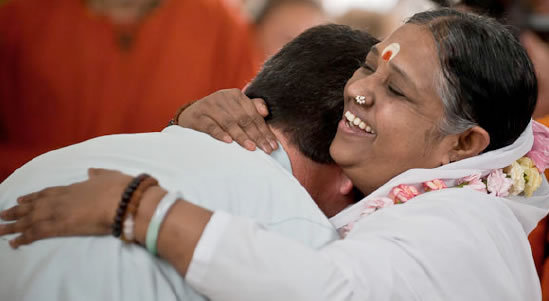(Photo courtesy of Yogi Pranksters)
"We all suffer," my teacher says, his voice coming from behind me, circling around the back of the room. "We come here to remember that we are not alone in our struggles," and I look down at my green yoga mat, wedged in a mosaic of rubber spread out in all four directions, only a couple inches of hardwood visible between.
At the top of our sun salutation, Pete stops us, and with our hands at our heart we remember Robin Williams.
(The Gorilla Foundation)
Just like Big Bird and MC Hammer, you could say I also grew up with this over-the-top, far out, amazingly-eccentric actor. Memories of Williams dressed up in wigs and masks and flubber to become an English nanny, or just his head orbiting Baron Munchausen's world, and later as the wise therapist telling a young Will Hunting:
You'll have bad times,
but it'll always wake you up
to the good stuff
you weren't paying attention to."
... these are scenes that colored my childhood, taught me the power of creativity, dared me to live outside the box.
Robin Williams' struggles with depression were also no secret, not to me, nor to the world. But for me they were personal. And they were forgiven, even celebrated. With a great deal of bipolar disorder in my immediate family, I've watched depression's dark tentacles wrap themselves around our hearts in the most insipid and life-altering ways. I've seen and felt the shame of mental illness as it rises up to challenge the American creed of one's right to the pursuit of happiness. Williams' larger-than-life character, creativity, and especially his sadness provided a shelter -- a space in society -- for the wildness to come out, and his suicide has shocked and saddened so many of us, especially here in San Francisco.
Though you won't find too many Facebook status updates about it, the World Health Organization now cites suicide from depression as the third-leading cause of death worldwide for ages 15-44 (male and female). It is the second-leading cause of death tor teens and young adults, aged 10-24. By 2020, the global suicide rate is expected to double, from one death every 40 seconds to one lost life every 20. Meanwhile, the availability and adoption of antidepressant medication grows. In her book, Yoga for Depression, author and Yogi Amy Weintraub writes:
Currently, scientists estimate that our collective knowledge doubles every 18 months. But with that increased information has come a loss of connection, a loss of meaning, a loss of transcendence, the kind so easily achieved in ancient and indigenous cultures. We are suffering in epidemic proportions -- as individuals, as a community, and as a culture. We may have more information, but we have lost the truth of who we really are, the knowledge that at the core of our beings we are not separate from others and from the universe.
Here in the studio, it is hot and sweaty now, and although we first introduced ourselves, I have long since forgotten my neighbors' names or what I was stressed out about before I came. After three rounds of sun salutations, my mat is slippery, my heart is sounding, and my head is clear. My breath, flowing in and out in concert with all 60-some-odd people in this class, has absolved me.
My teacher has this card he gives out that says, "This coupon entitles the bearer to one free hug." It's a joke, mostly, as it's nearly impossible to leave the studio without getting a hug. After practicing for a year and making new friends, I often get more hugs in this class than I do the whole rest of the week. The community -- even when I don't know anyone else in the room -- is what gets me out of my house and to the studio, especially on those days when I'm feeling isolated and alone.
In my life, I've encountered some people who understand this, and others who do not. Sometimes they surprise you.
One of the latter: A professor in a renowned design program that birthed such social tech phenomenons as the "check-in" app FourSquare once stopped me as I ran through the hall with my yoga mat and asked, "Why go to a class when you can do it at home?" And indeed in that program I learned how to humanize technology, programming sensors to make patches of grass play music and sacrificing much sleep in front of a computer screen to achieve other feats of networked interaction, all of which, however magical-seeming in the end, never gave me hugs or quieted the unrest deep inside me.
And at the other end, there is Amma. This living Indian guru has dedicated her life to giving hugs -- fierce, silent, and by many accounts, life-changing ones. This woman, whose name means mother, connects with strangers who line up into the night for a brief respite in her arms. People's stories -- lifelong struggles and suffering being cured in the warmth of this woman's embrace -- are remarkable and consistent. When I told my 100-year-old grandmother about Amma, she simply nodded and said, "forgiveness."
The Yogis have a word for our unified consciousness -- they call it Atman. Only when we are under the impression of our separation or disconnection do we suffer. As Albert Einstein once said, "Our task must be to free ourselves from this self imposed prison by widening our circle of compassion to embrace all living creatures and the whole of nature and it's beauty."
And I wonder about this "self-imposed prison," this suffering. I watch it as Facebook status updates replace face-to-face updates, as voice-to-text technology keeps coming and Siri becomes our closest confidante, and now, I think about the ways we suffer, so often in secret, as we grieve Robin Williams.
But my thoughts are interrupted. Two arms are opening in front of me, beckoning me in, and there is no stopping the smile that spreads across my face as I accept my teacher's free hug. I think of Amma, somewhere out there, her arms also open and remember her words:
"We expect too much from people," she says, "We expect them to be with us forever."
Need help? In the U.S., call 1-800-273-8255 for the National Suicide Prevention Lifeline.
For more on Jenine, check out her blog.
She practices yoga with Pete Guinosso in the San Francisco Bay Area and studies with Fu Schroeder at Green Gulch Farm and Zen Center.



